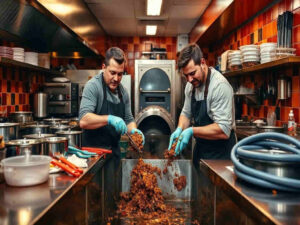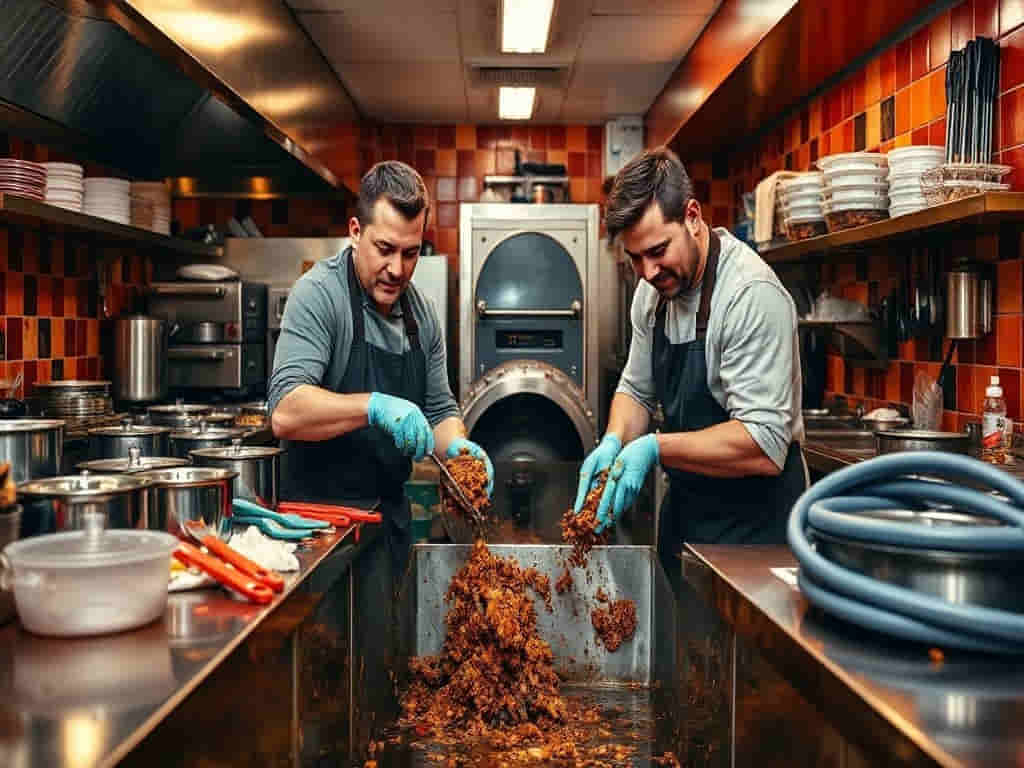How Grease Trap Failure Can Impact Your Food Business Operations

The Friday night rush is in full swing at your cozy Heights eatery. Customers are savoring your perfectly spiced gumbo, laughter and clinking glasses filling the air. But then, an unpleasant smell seeps into the dining area. Before you know it, the sinks are backing up, and the mood shifts. Your team scrambles to manage the mess, but it’s too late—patrons are leaving with wrinkled noses, and the night you hoped would be profitable turns into a disaster.
Sound familiar? If not, consider yourself lucky—but also forewarned. Regular restaurant grease trap cleaning isn’t just another line item on your to-do list. For Houston restaurants, it’s a cornerstone of operational success, customer satisfaction, and legal compliance. Let’s dive into the chemistry, the risks, and the regulations that make this routine maintenance an absolute must.
What’s the Big Deal About Grease Traps?
Every plate you wash and every pan you clean sends fats, oils, and grease (FOG) down the drain. Without intervention, this FOG flows into your pipes and eventually into Houston’s sewer systems. That’s where grease traps come to the rescue, intercepting these substances before they wreak havoc.
Here’s the science: When fats and oils cool, they solidify. Mix that with alkalis in the water—think dish soap or cleaning agents—and you’ve got saponification. This process creates soap-like solids that cling to pipe walls, narrowing passageways and causing stubborn blockages. Over time, this build-up doesn’t just slow things down; it brings everything to a screeching halt.
Why should you care?
- Blocked Pipes Mean Lost Business: Slow drains lead to slow service, and in the restaurant world, every second counts.
- FOG Overflows Cause Environmental Damage: Sewer backups from unmanaged FOG don’t just cost money; they harm the environment and attract penalties.
- Unpleasant Smells Drive Customers Away: Nothing kills a dining experience faster than a bad smell.
Regular restaurant grease trap cleaning eliminates these risks and keeps your operations running smoothly.

The Domino Effect of Neglecting Grease Traps
Think skipping a grease trap cleaning or two isn’t a big deal? Think again. The ripple effects of neglect can devastate your business:
- Operational Nightmares: Picture a Saturday dinner service derailed because the kitchen sink is unusable. Downtime like this costs you revenue and reputation.
- Customer Complaints: A single bad Yelp review about “the smell” can haunt your restaurant’s reputation indefinitely.
- Fines and Violations: Overflowing grease traps aren’t just unsightly—they’re unsanitary, earning you fines or even temporary closure by Houston’s health inspectors.
- Environmental Consequences: Your grease trap isn’t just about your pipes. When FOG spills into the sewer system, it contributes to massive blockages, putting you on the radar for hefty penalties.
Avoid these headaches with regular restaurant grease trap cleaning performed by professionals.
Navigating Houston’s Grease Trap Regulations
Houston takes grease trap maintenance seriously, and so should you. The City of Houston’s Code of Ordinances, Chapter 47, Article V sets clear standards for managing grease traps:
- Regular Cleaning Requirements: Grease traps must be cleaned when they reach 25% capacity or at least every 90 days unless you qualify for an exemption. High-volume kitchens may need more frequent cleanings based on FOG production.
- Proper Documentation: Keep records of every cleaning service, including the provider’s information and the date of service. Inspectors can request these records at any time.
- Licensed Waste Haulers Only: FOG disposal isn’t a DIY project. Houston mandates that only licensed haulers can legally transport and dispose of grease waste.
Failure to comply with these standards could result in fines, inspection failures, and even operational shutdowns. For more details, visit the City of Houston’s official grease management guidelines.
Staying on top of restaurant grease trap cleaning not only keeps your establishment compliant but also ensures your peace of mind.
Why Regular Grease Trap Cleaning Pays Off
Think of grease trap cleaning as an investment, not an expense. Here’s what you gain:
- Seamless Operations: A clean grease trap keeps your kitchen running like clockwork, even during peak hours.
- Cost Savings: Avoid the steep price of emergency plumbing calls and pipe repairs.
- Healthier Reputation: Customers notice cleanliness, and a well-maintained kitchen makes a lasting impression.
- Environmental Stewardship: Proper FOG management contributes to a cleaner Houston, aligning your business with eco-friendly practices.
Choosing a Grease Trap Cleaning Partner
Not all grease trap cleaning services are created equal. Here’s how to pick a partner you can trust:
- Licensed and Insured: Ensure the provider is compliant with Houston’s regulations and has the credentials to prove it.
- Experienced in High-Volume Kitchens: A team that understands the unique demands of restaurants will deliver better results.
- Transparent Pricing: Avoid surprises by opting for a company that provides clear, upfront quotes.
- Full-Service Solutions: Look for providers that offer everything from routine cleaning to emergency services and compliance support.
When choosing a partner for restaurant grease trap cleaning, prioritize expertise and reliability to ensure your kitchen stays operational and compliant.
Take Charge of Your Kitchen’s Future
Houston’s food scene is vibrant, competitive, and full of potential—but only for those who manage their operations wisely. Don’t let an overflowing grease trap put your business at risk. Schedule a cleaning today, protect your reputation, and keep your kitchen humming. After all, the secret to great food isn’t just the ingredients—it’s a clean, efficient kitchen behind the scenes.







Leave a Reply